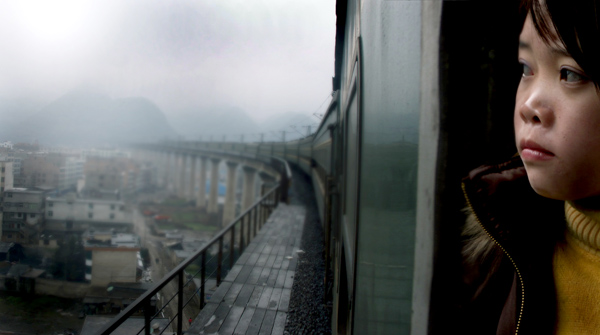|
Reviews of Recent Independent, Foreign, & Documentary Films in Theaters and DVD/Home Video

LAST TRAIN HOME
Fan’s documentary takes place in and around the largest human migration in the world, during the Chinese New Year, when millions of factory workers flood the outdated and insufficient train system and head toward hundreds of destinations in the country’s still-agrarian north. A narrative even bigger than the event forms. Last Train Home is a story of modern China and of what the word “modern” actually means for those millions of working families. One such family includes a mother and father, who toil in a factory thousands of miles away from their rural home for the equivalent of a handful of dollars a day, and a grandmother, who struggles to keep her young grandchildren fed and in school while tending what’s left of their little farm. The Zhang family is clearly at one edge of civilization, but whether it’s the beginning or the end is the question. Have we accepted globalization and finally embraced it, or are we only beginning to recognize what it’s done and continues to do to a society like China’s? The country’s auspicious rise comes directly out of the developed world’s demand for cheap labor, yet Fan is here to proclaim that it’s anything but cheap. To read between the lines in Last Train Home is to see that these are not only Chinese problems, but, in fact, there is an international complicity happening here. When the Zhang’s teenaged daughter, fervent in her ambition to get off the farm and begin the factory grind herself, boards the train with her parents, the word “hopeless” springs to mind. The Zhangs, in that moment, move from eking out an identity to merely eking out an existence. With its unrelenting and bleak look into their lives, Last Train Home poses more questions than most films you’ll see right now. “I hardened my heart. I had no
choice. That’s life,” says the mother. She and her husband have barely a
regret, as there was clearly never much of a choice to make. Simple
words of wisdom spoken by what is otherwise a sprawling population of
proletarian functionaries keep this effective documentary from becoming
the biggest downer since the Three Gorges Dam project or the Gobi oil
field (Jia’s and Wang’s examples, respectively, of industrialization
gone wrong). Fan’s directorial influence is subtle, yet with a probing
camera he eventually forms a broader humanistic story out of the more
intimate one. By the conclusion, we find ourselves smack in the middle
of the Zhangs’ (very real) world. China’s new
documentary movement is conservative—these films
second-guess the prevailing notion of progress over a more traditional
ideal. Here, Fan
is firmly telling audiences, both domestic and international, it’s about
time they started reading between the lines themselves.
Michael Lee
|

